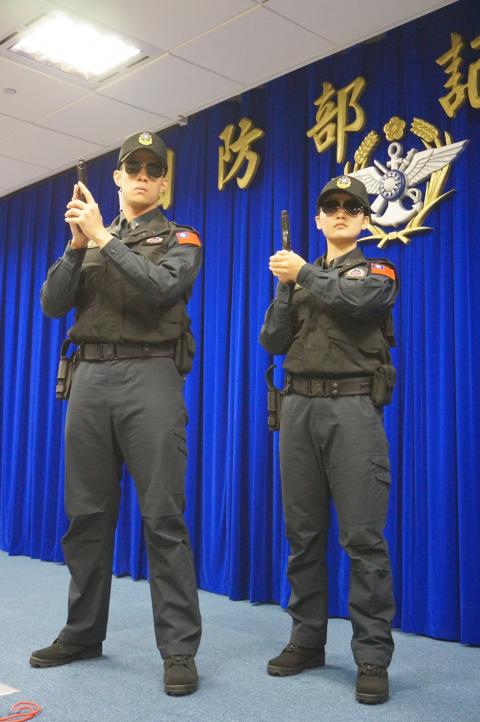The presidential protection battalions of the military police are to receive new uniforms on June 1, Military Police Command Chief of Staff Major General Feng Yi (馮毅) said yesterday.
The changes are to apply to the 211th Battalion and the 332nd Battalion that guard the Presidential Office Building and the presidential residence, Feng said.
The new uniforms have been designed to provide better agility, mobility and comfort, Feng said, adding that they are black for the “intimidation factor against wrongdoers.”

Photo: Tu Chu-min, Taipei Times
The new uniforms replace the existing suits, green shirts and dress shoes which have been used since 2007. Personnel have complained that the suits restricted their mobility and were inconvenient.
The new uniforms are comprised of a cap, sunglasses, shirt, duty vest, utility belt, duty pants and field boots, and they cost NT$4,800 (US$159) per officer or about NT$8.6 million in total.
The vests have a pocket for a radio near the collar and bear the military police’s insignia and its English acronym on the chest, while a tab in Chinese on the back identifies the officer, Feng said.
The duty pants are waterproof and sturdier than those formerly issued to the battalions, he said.
The deerskin boots offer more comfort when standing on guard duty and better mobility in emergency situations, he added.
The battalions are to provide feedback and evaluations of the new uniforms, Feng said.
If the performance of the new uniforms is satisfactory, the government is to consider broader changes of uniforms across the Military Police Command, as well as for counterterrorism units and the judicial police, he added.
Meanwhile, the Marine Corps yesterday said it would introduce a new uniform that is tiger-striped to maintain the identity of the corps.
Previously, the Ministry of National Defense had mandated that the entire armed forces adopt a “digital” camouflage uniform.
However, the Marine Corps has worn tiger-striped camouflage since 1979 and many retired marines had lobbied against the change.
The new marine camouflage uniforms are to feature tiger stripes that set them apart from those of other services, Marine Corps Command Chief of Staff Major General Liu Yu-ping (劉豫屏) said.
Digital camouflage is widely used by Western armed forces because it provides better concealment than traditional patterns, Liu said.
The uniforms are a general-purpose pattern designed for coastal, urban and jungle environments, and the nation’s 9,000 marines are to receive them before Jan. 1 next year, he said.
Although the new uniforms resemble the old ones, tests by computer simulations and evaluators have shown they surpass the old by better concealing troops by up to 33 percent, he said.
“The digital tiger stripes are made of sturdier, more breathable and lighter materials. The difference to the 1979 pattern is heaven and earth,” Liu said.
The estimated total cost of the new uniforms is NT$49 million, or NT$2,952 per marine, he said.

RESOLUTIONS DEBATE: Taiwan’s allies said that UN and WHA resolutions cited by China and other nations ‘do not determine Taiwan’s participation in WHO activities’ A proposal to invite Taiwan to this year’s World Health Assembly (WHA) was rejected on Monday, resulting in Taipei’s absence from the annual meeting for a ninth consecutive year, although partners spoke up for Taiwan’s participation at the first day of the meeting. The first agenda item after the opening was a “two-on-two debate” on a proposal to invite Taiwan to participate at the WHA as an observer. Similar to previous years, two countries made statements in favor of the proposal, while two others expressed their opposition. Philippine Secretary of Health Teodoro Herbosa, president of the 78th WHA, accepted the WHA General Committee’s

Palauan President Surangel Whipps Jr arrived in Taiwan last night to kick off his first visit to the country since beginning his second term earlier this year. After arriving at Taoyuan International Airport at around 6:30 pm, Whipps and his delegation were welcomed by Minister of Foreign Affairs Lin Chia-lung (林佳龍). Speaking to gathered media, the Palauan leader said he was excited and honored to be back in Taiwan on his first state visit to Taiwan since he was sworn in this January. Among those traveling with Whipps is Minister of State Gustav N. Aitaro, Public Infrastructure

Premier Cho Jung-tai (卓榮泰) on Friday laid out the Cabinet’s updated policy agenda and recapped the government’s achievements ahead of the one-year anniversary of President William Lai’s (賴清德) inauguration. Cho said the government had made progress across a range of areas, including rebuilding Hualien, cracking down on fraud, improving pedestrian safety and promoting economic growth. “I hope the public will not have the impression that the Cabinet only asked the legislature to reconsider a bunch of legal amendments,” Cho said, calling the moves “necessary” to protect constitutional governance and the public’s interest. The Cabinet would work toward achieving its “1+7” plan, he said. The

Nvidia founder and CEO Jensen Huang (黃仁勳) hosted a dinner in Taipei last night with key Taiwanese suppliers to celebrate the successful mass production of the company’s new Blackwell AI systems. Speaking to the media earlier yesterday, Huang thanked Nvidia’s Taiwanese partners for their contributions to the company’s ecosystem, while also sharing his plans to meet with Taiwan Semiconductor Manufacturing Co (TSMC) founder Morris Chang (張忠謀). In response to rumors that Nvidia will launch a downgraded Hopper H20 chip for China in July, Huang dismissed the reports, saying, “That is not true.” He clarified that there